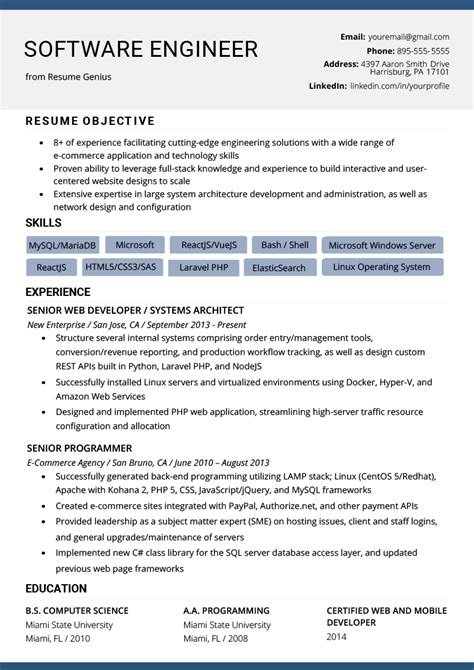Learn how to identify and highlight key software engineering skills, develop a skills-based resume, and showcase problem-solving abilities for your techIn the competitive field of software engineering, having a strong resume that effectively showcases your skills and abilities is crucial. Employers are not only looking for candidates with the right technical proficiencies, but also those who possess problem-solving abilities and a strong foundation of key software engineering skills. In this blog post, we will explore the importance of identifying these key software engineering skills, and how to effectively develop a skills-based resume that highlights your technical proficiencies and problem-solving abilities. We will also discuss the best strategies for showcasing your relevant technical proficiencies and problem-solving abilities to make your resume stand out to potential employers. Whether you’re a seasoned software engineer or just starting out in the field, these tips will help you create a resume that effectively communicates your software engineering skills and qualifications.
Identifying Key Software Engineering Skills
As a software engineer, it is crucial to have a strong grasp of technical proficiencies that are relevant to the industry. One of the key software engineering skills to identify is proficiency in programming languages such as Java, Python, or C++. These languages are widely used in the field of software development and having expertise in them can be a valuable asset on a resume.
Another important software engineering skill to highlight is problem-solving abilities. Employers in the tech industry are always looking for individuals who possess the ability to solve complex problems and think critically. This can be demonstrated through past experiences in resolving technical issues, developing innovative solutions, or participating in coding challenges.
Furthermore, it is essential to showcase a strong understanding of software development methodologies such as Agile or Scrum. Having experience working in an Agile environment or being familiar with the principles of Scrum demonstrates a candidate’s ability to work effectively in a team-oriented, iterative process, which is highly valued in software engineering roles.
Developing a Skills-Based Resume
When it comes to crafting a compelling resume for a software engineering position, it’s important to highlight your relevant technical proficiencies in a way that stands out to potential employers. One effective approach is to develop a skills-based resume, which focuses on the specific abilities and knowledge that make you a strong candidate for the job.
Using a skills-based resume allows you to showcase your expertise in software engineering and related areas, such as programming languages, development tools, and project management. By highlighting these key software engineering skills in a prominent section of your resume, you can demonstrate your qualifications in a way that resonates with hiring managers.
Additionally, a skills-based resume provides an opportunity to emphasize your problem-solving abilities and other soft skills that are valuable in a software engineering role. For example, you can showcase your experience in identifying and resolving technical challenges, working collaboratively in a team environment, and adapting to new technologies and methodologies.
Highlighting Relevant Technical Proficiencies
Highlighting relevant technical proficiencies on your resume is essential for standing out in the competitive field of software engineering. Employers are often looking for candidates who possess specific skills that are directly applicable to the job at hand, so it’s important to effectively showcase your technical abilities. One way to do this is by listing your technical proficiencies in a dedicated section of your resume, making it easy for hiring managers to see at a glance what you bring to the table.
When highlighting your technical proficiencies, it’s important to be specific about the software engineering skills you possess. This can include programming languages, software development tools, and other technical competencies that are relevant to the roles you are applying for. Additionally, providing examples of how you have applied these technical proficiencies in previous projects or work experiences can further demonstrate your capabilities to potential employers.
In addition to simply listing technical proficiencies, consider including any relevant certifications or specialized training you have completed. This can help bolster your qualifications and demonstrate your commitment to staying current in the ever-evolving field of software engineering. By effectively highlighting your relevant technical proficiencies on your resume, you can increase your chances of catching the attention of employers and securing opportunities in the competitive software engineering job market.
Showcasing Problem-Solving Abilities
Showcasing Problem-Solving Abilities
When it comes to showcasing your problem-solving abilities on your resume, it’s important to provide concrete examples of times when you successfully identified and resolved complex issues. Employers are often looking for candidates who can think critically and find creative solutions to challenges, so highlighting these skills can set you apart from other applicants.
One way to demonstrate your problem-solving abilities is to use specific technical examples from your past work experience. Whether it’s troubleshooting a software bug, developing a new system architecture, or optimizing a database structure, including these accomplishments on your resume can show potential employers that you have the skills they’re looking for.
Additionally, you can showcase your problem-solving abilities by discussing any successful projects you’ve completed, especially those that required innovative solutions or quick thinking. Whether you spearheaded a team effort to address a major technical issue or implemented a new process that improved efficiency, providing details about these projects can illustrate your ability to tackle complex problems and deliver results.
